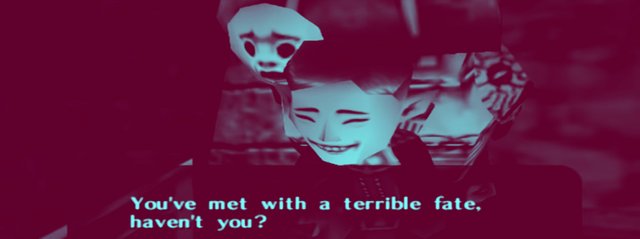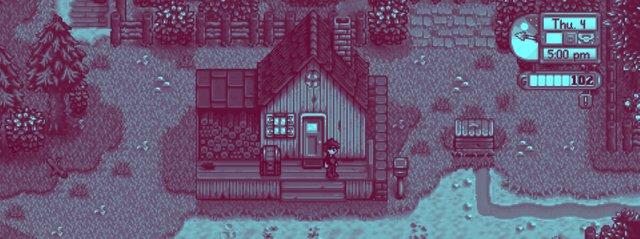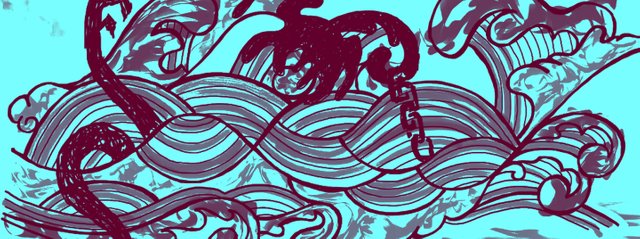A game designed to change lives
I can finally picture it in my mind: the game that when I play, will change my life for good. Full of awe, I can also picture how it will change hundreds of millions of other people’s lives and will be the glue that bonds us together.
Turn us into a tribe.
It’s far from a full HD mental picture, it’s Scotland-foggy at best. My mind’s vision is not able to spot any details, but I know it’s all there.
But before we get to that, let’s travel to Rio de Janeiro and rewind almost two decades.
I’m 12 years old and I’m talking to the mailman. He’s having a severe mental meltdown and I don’t know how to help. I’m a kid, goddammit.
I know this guy, we’ve talked before. The one thing I know for sure is that he is obsessed with his work. So much so that I have the impression his tunnel vision is almost pathological — and it seems like reality has finally caught up with him.
He is going to die in the next few minutes. They’re all going to die, except me.
Because I’m there, but I’m not really there.
I’m playing a game called Majora’s Mask: my parents allow me to play pretty much unsupervised. They look at the game boxes and generally that’s all the assessment that’s ever going to happen. They think I’m having a grand time living digital adventures (and they’re not wrong), what they don’t know is that this is a game about death — more specifically about grief.
I’m learning.
Nobody ever told me stories about people who are so fixated on their jobs that on their deathbeds they realise they haven’t accomplished what they really wished for. Those themes will pop up often enough later in life.
I’m indeed learning.
This game changed me — it gave me a gift of nuance. If I was a piano keyboard, it would be the same as adding the black keys for the first time. In fact, over the years so many games have changed me that I decided to become a gamemaker.
Now living on the other side of this maker/audience relationship, one interesting (and, frankly, unnerving) observation caught my attention: Majora’s Mask was not trying to change my life. That was just a collateral benefit, a lucky accident.
The transformative experience was never the main goal.
Why?
What is ‘success’ in the game world
The market success
Picture that: an office meeting room full of button-shirted Japanese people, but please don’t imagine the walls white and the ceiling grey — this is the headquarters of Nintendo! Things are damn fun here!
Those (fun!) executives are talking about their latest game release. They’ve crunched the numbers and the title seems to be doing quite well.
What are they talking about?
Nowadays games (and more so online games) can measure all sorts of things: how many times you log in, where do you go, with whom do you talk, how many times. Heck, some specific games like WiiFit and Nevermind collect even your cardiovascular data.
Yet this industry — very much like the mailman — is a little bit obsessed. It revolves around two suns:
- Sales
- Attention
Which are cryptic words. Let me translate what’s really being measured here:
- Is the invitation enticing enough?
- Does it satisfy a craving?
Those come in many colours and flavours. In the “good old days” sales used to be the revenue from just selling games, but the game title that defined the last two years — the titanic cultural phenomenon Fortnite — is completely free to play, yet it makes rivers of gold selling in-game hats and costumes that don’t really help you win the game.
Attention also shapeshifts quite a bit: ‘hours played’ is generally the measure, but in our world of professional videogame streamers and e-sports international leagues, there are many ways to make use of people’s eyeballs.
Don’t get me wrong: all serious companies (big or small) want their games to be fantastic experiences — not money and time sinks. A game needs to be entertaining and engaging if it wants to get to the top of the charts anyway. There are too many great games out there for you to succeed with a bad one.
Also I do understand that a company needs to stay alive, so money is a big deal. But having profit as your main and sometimes only driving force sounds a bit sketchy to me.
Of course, not all games are made equal.
The auteur success
Let’s picture a very different scenario: it’s 18:00 and a 27 year old Eric is sitting in his living room, coding since 12:37 when he finished his lunch. He has one freelance gig or another, mostly during the weekends, but he doesn’t make enough money to pay all the bills.
Could he land a good job with his University of Washington Tacoma computer science degree? Probably — but that’s the whole point. When Eric graduated and started to feel the pressures of adult work life (in particular office life), he started to grind his teeth.
It made him cringe.
That’s ok though. His girlfriend is covering most of the apartment’s expenses — for a reason.
You see, Eric is a creative soul and he spent a couple of years now working by himself on something he truly cares about — a game. A relaxing game experience that reflects his worldview: your character quits an office job and goes to live on a farm. Corn, potatoes, chickens and getting to be a part of a tiny rural community — that’s his masterpiece, a project that will take more than 5 years to complete.
It’s fair to say that Eric’s initial success measures were not sales or attention. He had something to say! Forget Hollywood superproductions, we’re in the realm of independent auteurs now.
He needed to express — he wanted his piece of art to make people feel that ‘yeah, I get you’ moment.
His game — Stardew Valley — was an explosive success. People truly cared about it and made sure Eric knew the good he was creating in their lives. Even his secondary (or even tertiary, who knows?) goals: sales and attention, bore impressive numbers. In less than one year the broke broke Eric was a multimillionaire.
Does he have to work now? No. Not for the money. He has enough money to sustain several lifetimes.
Is he still working? Gods, yes.
Because he is not working for the cash, he’s working for the emotional reaction he is able to evoke. By operating this way I’m sure he created an experience capable of changing people’s lives — and indeed if you type ‘Stardew Valley changed my life’ on Google, you’ll find yourself surrounded by people who could only cope with depression, loneliness and the hardships of adulthood because of this gem.
But was he trying to, though?
Hardly so.
Even if this game’s main goal was less shady than just capturing my time and money, it still feels weird to me that the pinnacle of all benefits comes as a fortunate accident, not a designed goal.
But what if that was the main designed goal?
I’d like to entertain the idea that those moments of profound catharsis and life change could be the main focus — the bread and butter, the designed outcome of the creation, everything else being collateral. Not all games, but some bold games.
But how? How to be sure you’ve changed a life?
A game to shake the world
A bit of much needed context:
A good friend of mine from the Enspiral network sends me a link — he told me he knew one of the organisers, Gail Taylor, and that she was “the real deal”. He told me the project was interesting and also game related, so he wanted my expert’s opinion. I trust this guy, so I give it a look.
This is how I first heard about the Tomorrow Makers.
The project is really bloody weird. The idea is to create a massive game that will reprogram humankind: replace our current destructive operating system with a sustainable, even generative one.
Bold at best, delusional at worst. Quickly enough I found good reason to believe these people had not the slightest clue about game development and even game culture in general. For example, one of the movement’s founders, Michael Haupt, even claimed the game should have 1 billion active, passionate and engaged players — which, if you’re not familiar with the game industry yourself, it’s like proposing a company’s goal is to have 80 quadrillion dollars in yearly profit.
Yet, I delved deeper. I felt good about these folks and to me what really counts is the people: working on a crazy, silly or impossible project with good and caring people is a far superior experience than working on a great idea while surrounded by pricks. If these folks had my enspiralite friend's vouching, they were probably the real deal indeed.
And you know what? The same Michael who wrote that piece of salvador-dali-esque surrealist player goal is a kind-hearted guy with a very interesting professional journey and access to a wide range of resources I have no clue about.
Maybe the game industry is not ready for a billion players, but this group is not part of the game industry. The conversations are interesting and varied — from collective decision making to microbiology to spiritual mythology; nothing is off limits! I feel refreshed just interacting with such a multifaceted group trying to achieve the same (bizarre) goal. Their lack of ‘this is how it works in the game world’ allows radical ideas to be proposed and seriously discussed.
One thing I noticed quickly was that I had to be mindful about my language: my new peers did not share my game lingo (or, as my friend Rich Bartlett would put, my special words). This forced me to get away from the incomprehensible _twitch_s, _unity_s and _minecraft_s and assume a more entrepreneurial and even scientific way of communicating — this, in turn, stirred my mind to a more experimental mindset.
Click — did my brain.
This is when the machinery inside my mind found this discrepancy between the games that changed my life and the intention with which those same games were created in the first place. This is when I started to look at my own practice and realise that many of my best results were achieved out of luck, coincidence or secondary goals instead of intentional design.
And I started to think: what if it was not?
What? Your Ingenuity is Evolving!
I have a game out in the market. A very unusual game.
The part that gets people really bamboozled is that in 2016 I decided it was a good idea to create a card game — yes: an analogical, physical, touchable card game. My game has a smell. My game can be eaten by bookworms. My game can be thrown and caught.
Yet upon closer analysis, the material aspect of the game will seem the most common thing about it. It has no winners or losers. Most of its rules are mere suggestions, so much so that the game comes with several different rulesets you can experiment with. It oftentimes makes people cry and this is considered one of its best features.
In a spark of game design inspiration (or madness, depending on the point of view), my one and only unavoidable rule: “The game ends when the conversation is flowing and you don’t need it anymore”. It’s an autoimmune game.
Truth is, this game has followed the road less travelled since I had the first spark of inspiration that lead to its creation.
I had just moved to Berlin and I was having a hard time making meaningful connections. Two months of bad dates, conversations that didn’t lead to friends and overall loneliness left me sad and a bit desperate. I had to try something or I’d succumb to the city’s emotional coldness.
My creation process was a design process — a clear here’s a problem > let’s find a solution path. When I started creating what would become jojojo, it was not even a game, just a bunch of post-its with strange questions. Everything that happened after that, including turning this weird artifact into a game, was an iteration and experimentation process that lead more and more to the solution of my connection problem.
In a way, my game was designed for life change from the beginning: but in an extremely narrow way — just my life.
One day a friend of mine asked me to borrow the prototype — which I thought was odd! After all it was a game designed to work for me specifically. I then did something I’d do hundreds of times: I didn’t join, I just observed. He brought the game to a table, people started to play… and laugh. For the first time I opened my eyes to the possibility of this artifact not needing my personality to function.
The game changed a bunch since that prototype — I stirred its creation process to accommodate as many non-me humans as it could. I also started to entertain the idea of making it into a product I could sell, perhaps even get my livelihood from.
Of course, this meant budget spreadsheets, supplier selection, international shipping and all that fun stuff. Above all, this meant a daily and intimate relationship with the top two game industry best friends forever: sales and attention.
From the start I was aware of them — and their pitfalls. I didn’t get into this business for the money and I’d not let the money processes push me away from my initial (and honestly, best) goal: human connection.
So by the time I was setting my first yearly sales goals, I also set a very unusual metric alongside them: I wanted 10 strangers to send me messages saying the game was truly important for them. I knew other creators received this sort of message, so I thought it wouldn’t be nonsensical to imagine I’d perhaps get some myself — even if I had no idea of how often that happened. Many would call this a vanity metric, a useless yet-well-dressed number, but honestly this pursuit gifted me with a very powerful resource: determination.
By the end of 2018, I had 14 emails.
When I did my sales retrospective and realised I sold more than my initial goal, I smiled! I laughed! I promised to buy myself a nice bottle of wine to celebrate it.
When I counted and re-read my stranger’s emails, I wept.
That was the taste of magic.
How to bottle magic
My email goal was the first tool I had to tackle this intentionality issue. It was still clunky and accidental: my game had no mechanic that asked people to send a message, that’s just a thing that happens in our society.
But if I wanted to make it by design, I could create a game that literally asked people to send this kind of note. This logic felt like being on the right road but in the wrong vehicle — I felt it was too narrow and too naive.
So at some point I was forced to ask myself: if I want to change people’s lives — what does that mean? What is life change?
Framing this ethereal “life changing experience” in a precise manner was important for future testing: to create a trackable experiment capable of being improved over time, I’d have to improve something!
Luckily I don’t have to solve this puzzle alone. I brought this topic to a bunch of friends and workgroups. Of course I asked my game industry fellows — I actually asked a wide range of game people, from famous game designers with GDC talks to students in their second year — but I also made sure to open the discussion to people outside of the game world, notably my fellows from the Tomorrow Makers and Enspiral networks.
This is a work in progress and I’m sure it can be refined and improved, but this is where I’m at right now.
A life changing experience is an experience that’s the main (but not necessarily only) facilitator of:
- A memory capable of changing one’s behaviour
- A memory capable of changing one’s perception of self
- The establishment of a key human connection
- The acquisition of a key resource
- The creation of a craving for a key resource
I call those the pillars.
So, applying this criteria to the game world, if a game wants to be a life-changing game, it needs to catalyse one or more of the pillars by design, not by accident. For the sake of clarity, allow me to give theoretical game examples:
- A memory capable of changing one’s behaviour:
A cooking game that shows you how to reduce your food waste by using ingredient bits that you’d normally throw away, introducing a life-long ritual to your daily routine.
- A memory capable of changing one’s perception of self:
A game character that is mostly relatable and kind, but also has abusive behaviours — and you end up finding the same behaviours in yourself, triggering a self-reflection process.
- The establishment of a key human connection:
An online social game with an intentional player introduction feature that ends up being the key element in you meeting your future partner.
- The acquisition of a key resource:
A game that teaches you the basics of meditation, a skill that you will use two years later to fight a panic attack that might have severely injured you.
- The creation of a craving for a key resource:
A simplified yet engaging construction game that introduces you to the joys and intricacies of architecture, which will inspire you to study it during your university years and define your professional career.
The next evident step (and the next evident article) is to propose a couple of different indicators — numbers that can be tracked, proving that the game is reaching its life-changing goals — that directly relate to the pillars.
If you’re interested in this whole life change game subject, my intention is to gather a community of people around it — who knows what sort of experiment this path might lead to? I’m still unsure on the best platform to host this community, but keep in touch here: [email protected]
I’m interested in who you are and why this speaks to you, so please drop me a line.





Congratulations @joriam! You have completed the following achievement on the Steem blockchain and have been rewarded with new badge(s) :
You can view your badges on your Steem Board and compare to others on the Steem Ranking
If you no longer want to receive notifications, reply to this comment with the word
STOPVote for @Steemitboard as a witness to get one more award and increased upvotes!